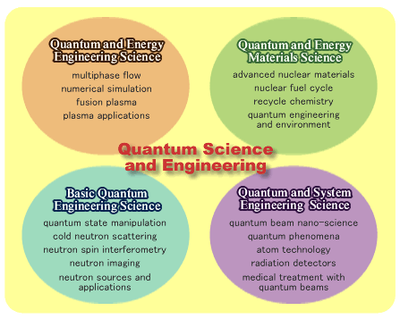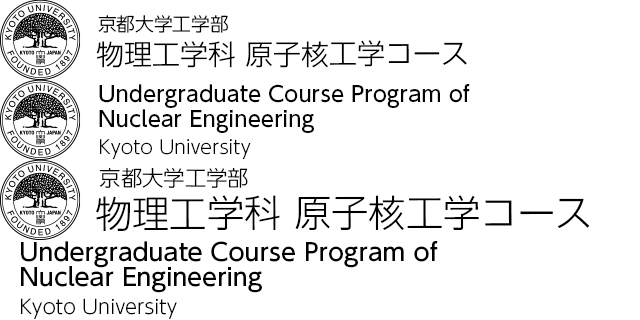Educational Policy
In response to more sophisticated and diversified education and research, systematic curriculums, including lectures on cutting-edge technology, are provided. Through research work, students are guided to take a comprehensive approach to detect and resolve problems, in addition to strong analysis ability conducted from a microscopic viewpoint.
Furthermore, the capability to make discussions and presentations will be enhanced through small-group seminars and meetings for reading research papers. Lectures with business people as guest speakers and internship programs will be effectively utilized to promote the growth of a sense of purpose and the ability to solve problems.
Research Groups
In implementing its research and education into quantum science and engineering, the Department of Nuclear Engineering is divided into four research groups, with cooperation between each divisions and sub-departiments. Each group consists of members from the faculty (the Nuclear Engineering program of the Faculty of Engineering Science) and the graduate school (Department of Nuclear Engineering).

- Quantum and Energy Engineering Science
- Quantum and Energy Materials Science
- Quantum and System Engineering Science
- Basic Quantum Engineering Science
Quantum and Energy Engineering Science
Safe and efficient use of the nuclear energy are required to realize the nuclear energy system which suits environment. The purpose of the nuclear energy science group is to contribute to the development of such energy system by the research of physics and basic engineering related to the generating and conversion of the nuclear energy.
Activities of our group include research for securing the safety of the apparatus in nuclear reactors (fission and fusion) and research of the fluid and thermal engineering relevant to the efficient use of generated nuclear energy. We, especially, put emphasis on the establishment of the multiphase flow science where gas, a liquid, and a solid are intermingled.
Moreover, aiming at realization of a nuclear fusion reactor, research is advanced by theory and the numerical simulation about the elucidation of the physical phenomenon in the magnetically confined high temperature plasma, and the development of the plasma control technique by electromagnetic waves.
Quantum and Energy Materials Science
Materials are studied to ensure the safety of nuclear energy systems of power reactors and nuclear fusion reactors and to safely manage radioactive wastes which are produced from nuclear energy utilization. Advanced materials are developed by using nano-technology which becomes available in the field of nuclear engineering.
For the efficient utilization of nuclear energy, physicochemical properties and chemical processing of nuclear materials are studied in order to recycle limited resources and to achieve ‘zero emission’ from nuclear fuel cycles. These advanced technology will be extended to more general chemistry and technology which are needed to establish the recycling-based society.
Quantum and System Engineering Science
Material science and life science look very far fields of research each other, however, they have common elements if you study them in the dimension of micron, and in far smaller dimension, nano size.
With view points of the state-of-the-arts, we are conducting comprehensive studies for a wide-spread research fields, and are performing basic studies and technology developments, which are common to numbers of research fields.
The weapons of our study are ions, electrons, X-rays, and laser beams, which are quantum beams with high performance, to make super-high temperature, super-high pressure and super-high density of deposited energy. We are studying and utilizing non-equilibrium states in the extreme environments described above.
Moreover, we are developing various detection systems to observe extreme phenomena, and are also applying quantum beams to medical treatment such as cancer remedy.
Basic Quantum Engineering Science
Characteristic phenomena and properties of quantum systems are studied theoretically, including elementary particles, neutrons, particle beams, lasers, atoms and molecules. Thereby various developments are advanced for quantum technologies on nanostructures, quantum state manipulation and detection, and so on.
Recently, intense pulsed neutron sources are under construction in US and Japan. The application of the intense neutron beam lies widely from fundamental science to engineering. We are now developing new design of sources for slow neutrons and new applications of slow neutrons to various fields, extending conventional nuclear engineering sciences.
Our topics : fundamental physics, quantum engineering, elementary particle physics, research of neutron spin interferometry, experiments and analysis of neutron scattering of condensed matter, design and assessment of neutron sources, measurements of nuclear data, developments and applications of multilayer neutron mirrors, physics and safety assessment of nuclear reactors.
